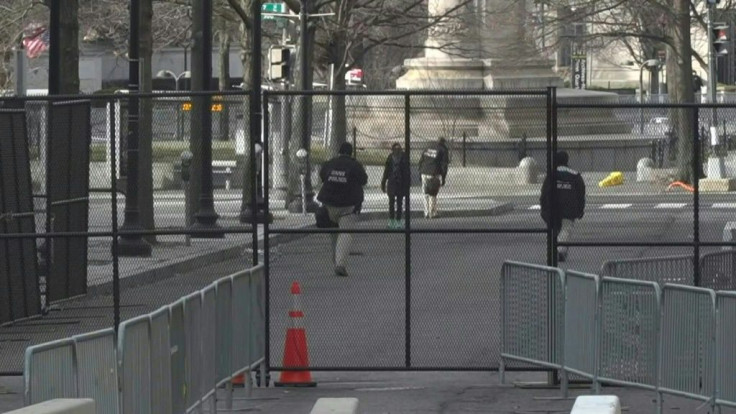September 18 Rally: How Law Enforcement Is Prepping To Protect The Capitol
Law enforcement in Washington D.C. is waiting with bated breath ahead of a right-wing rally on Sept. 18 that is dedicated to the rioters who stormed the U.S. Capitol on Jan. 6.
The memory of that event is a raw one for the agencies involved, given the withering criticism they have endured for allowing thousands to break their lines and batter dozens of police officers. This time, they are keen to not be taken by surprise by the Justice for Jan. 6 rally and they hope to apply lessons learned from that day to keep D.C. safe.
A blistering Senate investigation into the security failings on Jan. 6 detailed how agencies from the Department of Defense to the FBI and Capitol Police fell short in protecting the Capitol. The report highlighted a failure to share information properly between agencies, poor planning, a lack of proper equipment and a lack of leadership from key officials during the riot. Among the agencies faulted the most for the riot was the Capitol Police, which remains the lead agency in charge of security for Saturday’s rally.
The department does not want to repeat the same mistakes and they are working to apply lessons learned from the Senate report. Officers already began to reinstall the protective fencing around the Capitol to form the first line of defense against any violent demonstrators and ABC News reports that every available Capitol Police officer will be called on for duty Saturday. These measures are designed to ensure a sturdy first line of defense against any violent demonstrators and prevent officers from becoming overwhelmed.
Other agencies are also being kept in the loop. The local D.C. Metropolitan Police Department said that it is “fully prepared” and that it was in close coordination with federal law enforcement partners. CBS News reports that departments from surrounding areas in the D.C. metropolitan area will be on standby if required for additional backup.
The Capitol Police has also stepped up its coordination with the D.C. National Guard to ensure guardsmen are available to rapidly deploy if needed. On Jan. 6, the Defense Department was criticized for not responding quickly enough when police officers became overwhelmed and local leadership was panned for taking too long to call for backup.
Ahead of the rally, Defense Department spokesman John Kirby confirmed that a request was received from the Capitol Police and it was being processed. Unlike a typical state National Guard, deployment of the D.C. unit requires authorization from the Pentagon itself.

Intelligence sharing and collection have been ongoing for weeks. One criticism of the Senate report was that agencies experienced a “failure to imagine,” the same charge levied against the intelligence community after the Sept. 11 attacks for not connecting the dots ahead of the attacks. Police leaders testified that they did not receive specific enough intelligence in advance.
Online chatter has been under monitoring from the Department of Homeland Security’s (DHS) intelligence unit and the FBI has been watching social media sites as well.
Concern among these agencies is that members of extremist groups like the Proud Boys, Oath Keepers, or neo-Nazi groups could show up and risk escalating the chances of violence, especially if they arrive armed. A DHS bulletin also warned that a counter-demonstration is set to take place opposite the rally and confirmed death threats were issued to its organizers in advance.
"A counter rally is scheduled to take place on the same day at Freedom Plaza in Washington, DC, heightening the potential for violence between perceived ideological opponents," it reads.
Several officials insist that intelligence has been consistent that only 700 people will attend the Justice for Jan. 6 rally, but DHS intelligence head John Cohen cautioned that online rhetoric has been strikingly similar to the lead-up to Jan. 6. Concern about clashes between protesters and counter-protesters remains a concern, but the Capitol Police has been confirmed to be monitoring discussions on both sides to reduce the chances of a clash.
© Copyright IBTimes 2025. All rights reserved.





















